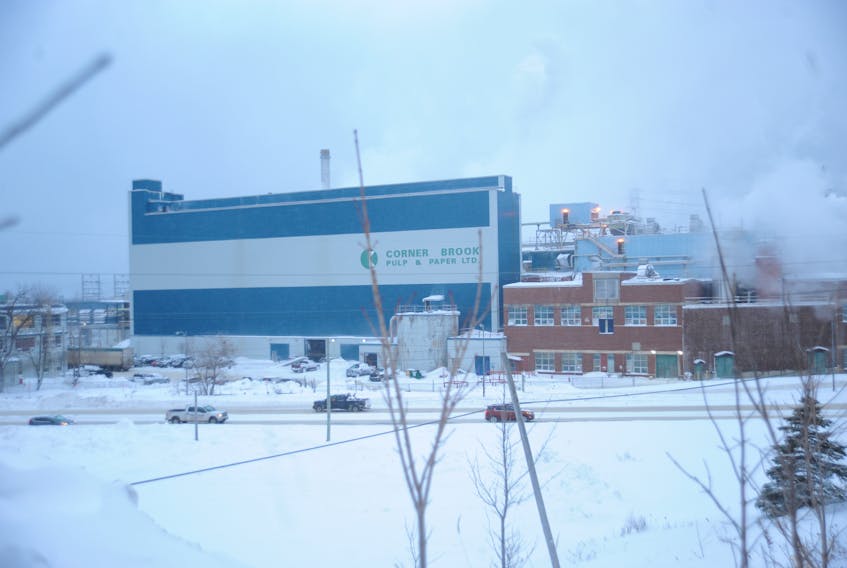Paul Humber is scheduled to meet with Corner Brook Pulp and Paper management today, but he is not expecting to hear much more than what most people already know about the tentative American tariff on Canadian newsprint.
The countervailing duty on newsprint imported to the United States was announced late Wednesday night as part of the American government’s response to Canadian paper that receives what the American government deems unfair subsidies from government sources.
The duty would affect each exporting company differently, but Corner Brook Pulp and Paper will be among the hardest hit, with a 9.93 per cent duty slapped onto its products.
Humber is president of Unifor Local 242, the union representing the mill’s papermaker employees and just one of several unions within the Corner Brook plant. He figures today’s meeting with company officials will bring union leaders up to speed on what’s happening.
“I don’t think it will be too different from what we’re already hearing in the media,” Humber said. “I’m sure the company will be coming up with a plan to deal with this and we may get an idea of what their timelines are for when they will let us know more details of what that plan will be.”
The American government is planning even more measures against Canadian newsprint later this year. In March it may introduce an anti-dumping tariff for paper the American government feels was sold into its markets at lower prices than it should have been.
Humber doesn’t expect that round of import taxation to be as big a blow for Corner Brook Pulp and Paper and its Montreal-based parent company, Kruger, as it will be for Canada’s other major newsprint producers that may have dumped product into the American market in recent years.
Either way, Humber said the union is anxious to see what happens next and what role the unions will play.
“We will have to wait and see what the company will do,” he said. “We are willing to work with the company and government to deal with this.”
Humber said there are still some positive aspects of the Corner Brook operation, despite this negative development. Most importantly, about half of the paper Corner Brook makes is sold to markets other than the United States and will not be affected by this American decision.
He noted the price of newsprint has risen recently and the Canadian dollar is currently well below par with the American dollar, which is always good news for any exporting business in Canada.
Still, according to a confirmation by Premier Dwight Ball, the countervailing duty might cost Corner Brook Pulp and Paper more than $8 million annually and there could be ripple affects throughout the province’s entire forest industry.
Mayor weighs in
Corner Brook Mayor Jim Parsons said it’s obviously not a good news day for the mill or the local economy, but the sky is not falling just yet.
“It’s never good when your city’s big anchor tenant gets such a monkey wrench thrown into its works,” said Parsons. “We will have to wait and see what Kruger will do. We are hoping Kruger will be resilient and able to make whatever adjustments it needs.”
Corner Brook Pulp and Paper contributes an annual grant, in lieu of municipal taxes, to the City of Corner Brook. This grant changes annually, but has been in the vicinity of $1 million for the last decade or more, and represents a significant component of the city’s coffers.
The city’s 2018 budget has accounted for a grant from the mill to the tune of $1,059,800.
Despite the protectionist approach by the American government, Parsons noted there are elements within the United States still fighting against the decision, fearing it could harm the American newspaper industry more than help its newsprint industry.
He hopes those forces can prevail in the fight against the tariff.
Issue of national significance
The Canadian government has asked the dispute settlement body of the World Trade Organization (WTO) to review the anti-dumping and countervailing investigations and duties out of the U.S.
In a 32-page submission issued Wednesday, Canada claims decisions coming out of the U.S. are inconsistent with its WTO obligations.
The application cites international agreements, including the General Agreement on Tariffs and Trade (1994) and the Agreement on Subsidies and Countervailing Measures.
It claims, among other things, that the U.S. Department of Commerce has restricted parties from other countries from submitting evidence, setting deadlines on submissions that “do not provide interested parties ‘ample opportunity’ to present all of the factual information necessary to fully defend their interests” before preliminary decisions.
It claims duties being imposed are beyond those allowed and the U.S. International Trade Commission review body is weighted in favour of U.S. complainants.
The U.S. government will be expected to respond.
The application lists more than 100 cases in question, covering cases involving such things as corrosion-resistant steel products from Italy, Chinese honey and Canadian softwood lumber products. The decision from Tuesday night, applying to Canadian newsprint, is not specifically cited.
No ask from company to date
Speaking specifically to the new duty on newsprint, the premier says the province has had no indication from Kruger if a resulting multimillion-dollar hit would risk a shutdown of the Corner Brook paper mill, or otherwise lead to a request to the province for assistance.
“We have not had those discussions yet,” Ball told reporters at Confederation Building Wednesday morning.
He said the provincial government is committed to continuing to work with Kruger, Corner Brook Pulp and Paper and the forestry industry.
The province does not have an official estimate, but Ball said the $8-million figure cited by the CBC for total cost expected from the new U.S. tariff to Corner Brook Pulp and Paper, would be in the right area.
“I think when you look at the number, I think your calculation is probably getting close. We see this as not tens of millions of dollars,” the premier said, adding that he believes the U.S. Department of Commerce came to an “unjust” decision in the case.
It was a preliminary decision, the premier noted. A final decision from the Department of Commerce is expected in May, although that deadline may be extended.
The case is to go to the quasi-judicial International Trade Commission later this year. If there is a finding of injury there, the tariffs will be maintained. If not, the tariffs can be removed.
Whatever the final cost to Corner Brook Pulp and Paper on the immediate decision, it comes on top of a nearing requirement for the business to make its first payment on a $110-million loan from the provincial government. The loan was issued in 2014 and the first payment is due in 2019. Kruger has paid the province $13.2 million in interest on the loan, from July 2014 to October 2017.
The province maintains the money was not an unfair subsidy, given it was issued as a loan.
It’s about free trade: Ball
The premier said he believes politics is at play in the U.S. decision. Asked if the new border charge was a reasonable demand by a U.S. producer, given the financial support for local mills being offered by Canadian papermakers, Ball was clear.
“This is about, do you believe in free trade? Do you believe in the partnership and the relationship that we’ve had between the United States and Canada for generations?” he said.
“What you’ve done, I would say, is you’ve created some damage in your own country as well. Because you have newspapers, their cost structure now will go up. We have publishers, their cost structure will go up, because of increased costs because of the duties and the tariffs,” he said. “Let’s not forget that these duties and tariffs do not go to support the industry in the U.S. This eventually, at some point, will end up in the treasury to support other programs in the U.S. So this is not something that actually evens or levels the playing field in the U.S. This is really money that will go into the U.S. treasury at some point.”









